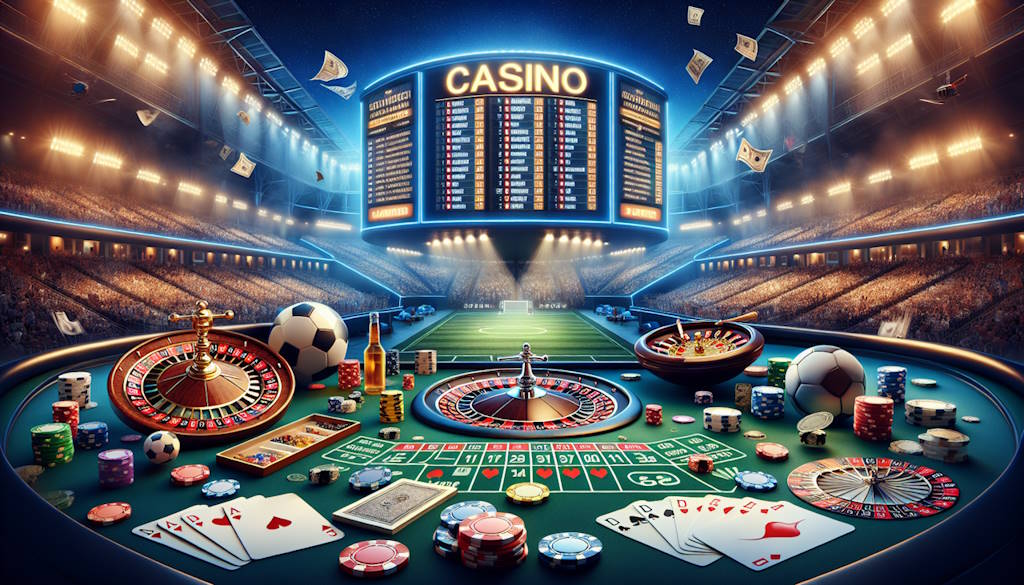Gambling has long captivated the human imagination, intertwining thrill and risk in a dance that captivates millions worldwide. But what if we step back and examine it through a sporting lens? Is gambling merely an ancillary activity, or can it truly be considered a sport in its own right? As we delve into this intriguing question, we’ll explore the nature of competition, the role of chance, and the psychological elements that come into play.
From the thrill of the casino floor to the strategic bets placed on online platforms, gambling embodies elements that resonate with the fervor of traditional sports. Yet, the debate rages: should it be recognized alongside football, basketball, and other athletic endeavors? Join us as we navigate the complexities of this multifaceted issue, uncovering the nuances that blur the lines between betting and sportsmanship.
The Intersection of Gambling and Sports

The intersection of gambling and sports is a dynamic arena where thrill, strategy, and risk converge, captivating millions across the globe. Picture the roar of a packed stadium—every cheer and gasp fuels not just the athletes on the field but also the hearts of bettors watching intently, tracking odds and outcomes in real time.
The momentum swings of a tight game can send ripples through the betting landscape, transforming a casual match into a high-stakes showdown. Herein lies the intricate dance between chance and skill: the betters intuition, informed by statistics and instinct, collides with the unpredictable nature of sports—where an underdog might rise, and a favorite may falter.
As regulations evolve and the accessibility of sports betting expands, this relationship is increasingly enshrined in culture, blurring the lines between spectator and participant. But can we truly label gambling as a sport itself, or does it serve merely as a thrilling adjunct to the athletic spectacle? This ongoing debate reflects deeper questions about passion, purpose, and the essence of competition.
Types of Gambling in Sports

In the realm of sports, gambling manifests in various intriguing forms, each catering to different preferences and levels of risk. Traditional betting, such as placing wagers on game outcomes or individual player performances, remains immensely popular, drawing in avid fans who seek to enhance their viewing experience.
Then there’s the exhilarating allure of live betting, allowing enthusiasts to stake their fortunes as the action unfolds, where every second can shift the odds dramatically. For those who prefer a more strategic approach, fantasy sports offer a blend of competitive spirit and analytical thinking, as players assemble dream teams and pit them against others in a quest for supremacy.
Additionally, pools and contests, like office brackets during major tournaments, foster camaraderie among friends and colleagues, intertwining personal stakes with collective excitement. Each type of gambling adds a unique flavor to the sports experience, illustrating how monetary engagement can enhance not just the thrill, but also the communal aspect of sporting events.
The Role of Skill vs. Chance

In the intricate dance of gambling as a form of sports, the interplay between skill and chance becomes a fascinating focal point. On one hand, consider the seasoned poker player, their mastery of psychology, odds, and strategy often elevating the game from mere luck to a nuanced battle of wits.
Conversely, the roll of the dice or the spin of a roulette wheel can turn even the most calculated plans to dust in an instant, underscoring the unpredictable nature of chance. This blend creates a unique tension that resembles traditional sports, where both methodical preparation and unforeseen circumstances can dictate the outcome.
Ultimately, while some may argue that gambling relies heavily on luck, the undeniable presence of skill—reflected in betting strategies and game analysis—invites a richer, more layered conversation about the true nature of competitive play.
Conclusion
In conclusion, the debate surrounding whether gambling can be classified as a form of sports remains a complex and multifaceted issue. While some argue that it embodies the same competitive spirit and strategic thinking inherent to traditional sports, others highlight the ethical and social implications that accompany gambling activities.
Ultimately, the classification may depend on individual perspectives and the cultural context in which gambling is practiced. As society continues to grapple with the growing intersection of gambling and sports, it is essential to foster informed discussions and policies that prioritize both entertainment and responsible participation.
For further exploration of this intriguing topic, click here.




